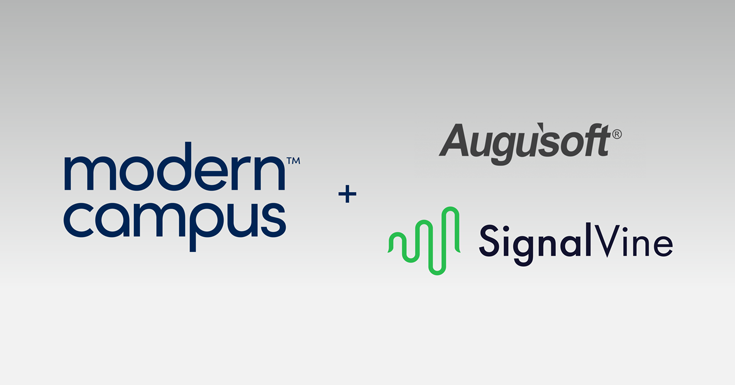Modern Campus Acquires Signal Vine and Augusoft
Author

UPDATED 01/21/22 with information regarding Augusoft acquisition.
In the span of one week, Modern Campus announced its acquisition of Signal Vine, the conversational text-messaging solution, and Augusoft, the noncredit course management platform, its latest in a series of rapid acquisitions in the last year. The announcements for the Signal Vine and Augusoft acquisitions outline most of the public details of the agreements, notably
- Signal Vine and Augusoft employees will be joining Modern Campus
- Signal Vine and Augusoft are the fourth and fifth acquisitions, respectively, by Modern Campus in the past year
- Augusoft Founder and CEO Cem Erdem will join the Modern Campus Board of Directors
- Current Modern Campus CEO Brian Kibby will remain in that capacity
These acquisitions are significant for Modern Campus for several reasons. First, Signal Vine has a broad customer base that enhances Modern Campus’s ability to cross-sell for broader domestic reach.
Second, the acquisition of Augusoft eliminates a key competitor from the marketplace while expanding Modern Campus’s customer base, functionalities, and administrative capabilities in the space of continuing education and professional development management. Moreover, existing Augusoft customers should benefit from the extensive resources Modern Campus offers in terms of research and development, product improvement, and in-house integrations.
Third, it rounds out a series of investments that increases Modern Campus’s ability to provide a robust one-stop shop for non-credit and alternative learning experiences. In less than a year, Modern Campus has added mapping and virtual tour functionality (nuCloud), curriculum management and degree planning capabilities (DIGARC), and a robust campus engagement platform (Presence). Signal Vine will improve Modern Campus’s admissions and enrollment capabilities and support its retention efforts with its automated, AI-powered workflows for prospective student follow-up and communications. Augusoft diversifies Modern Campus’s portfolio with a large and loyal customer base and a suite of customizable reporting and analytical tools grounded in best practices for program performance tracking.
Tambellini sees the addition of Signal Vine and Augusoft to the Modern Campus portfolio—and Modern Campus’s acquisitions as a whole— as significant to the continuing education field. The diversified functionality is designed to meet stakeholder expectations for personalized learning experiences. It also supports student engagement and social learning as well as content delivery formats of traditional continuing education. Modern Campus is likely banking on a future of higher education that transcends the limitations of traditional degree-granting models and anticipates the importance of engagement to the long-term relationship between a student and their institution.
Understanding the significance of what Modern Campus appears to be building requires context. Higher education is beset by a host of complex threats, challenges, and opportunities that include lower enrollment, decreased revenue, rising costs, institutional closures and mergers, and massive student debt that raises questions about the ROI of traditional degrees. Furthermore, students’ notion of what higher education success looks like is changing, microcredentialing is expected to become more important, and the student lifecycle is rapidly evolving. Institutions adhering to notions of face-to-face instruction being the gold standard, degrees being the only credential that matters, and tuition-based budgets that rely on “traditional” students are (or will be) struggling.
By bringing together disparate point solutions, Modern Campus is creating a full-service platform that engages learners from enrollment through advancement and beyond. This approach is noteworthy for at least three reasons. First, it signals a willingness to assemble a set of tools that anticipates future higher education scenarios that cater to a diverse student population that is more likely to need reskilling and upskilling than its predecessors. Second, it suggests that non-degree course management systems that have traditionally served continuing education and workforce development programs are evolving to accommodate the shifting and expanding needs of learners in those spaces. Third, it may offer a blueprint for how the acquisition of point solutions may be changing the competitive landscape for companies seeking to claim new or occupied territory.
Tambellini will closely follow the integration of Signal Vine and Augusoft into the Modern Campus product suite, its impact on institutional admissions, enrollment, and retention efforts, and how the continuing education and workforce development platform market responds to this acquisition.
Categories
- Academic Administration
- Advancement
- AI and ML
- Content Management
- CRM Platforms
- Customer Experience (CX)
- Cybersecurity
- Data Management and Analytics
- Enterprise Portals and Mobile Apps
- Event Management
- Finance
- HCM/HR
- IT Tools and Infrastructure
- Life at Tambellini
- Services
- Student
- Teaching and Learning
- Technology Leadership
- Thought Leadership
- Uncategorized
Share Article:

Other Posts From this Author:
© Copyright 2025, The Tambellini Group. All Rights Reserved.